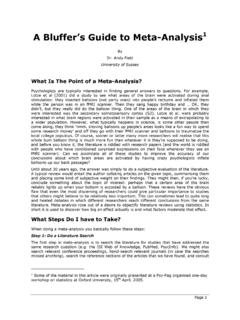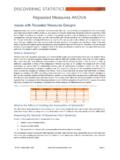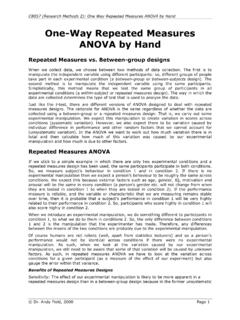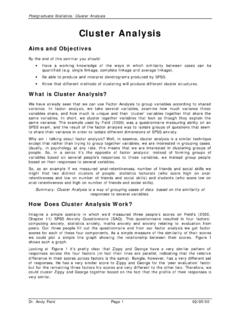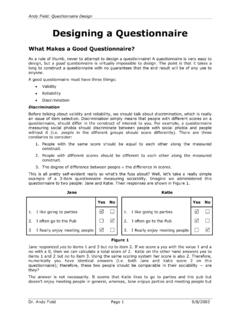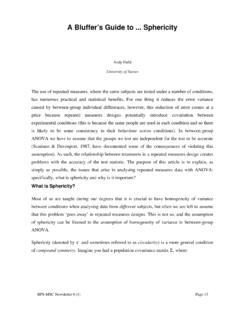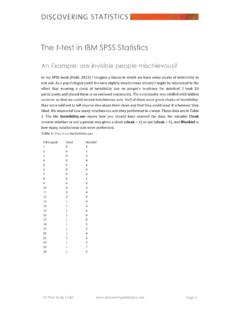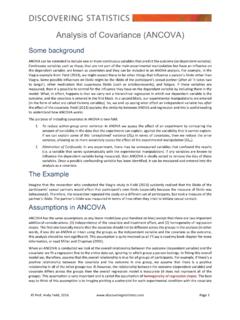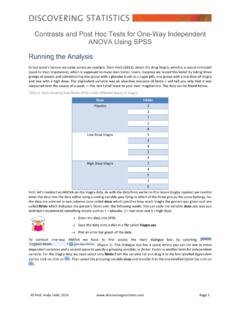Transcription of Discovering Statistics Handbook 2015-16
1 School of Psychology Module Handbook 2015/2016 Discovering Statistics Module Convenor: Professor Andy Field NOTE: Most of the questions you need answers to about this module are in this document. Please read it fully and carefully before your first lecture. NOTE: This document concerns the structure and content of the module. If you have questions about procedures, please consult the School of Psychology Administration Office in Pev1 2A13 or via c8552 : Discovering Statistics Professor Andy Field Page 2 Contents Contents .. 2 Module Overview .. 4 Assessed Learning Outcomes .. 4 Method of Student Feedback .. 4 Assessment .. 4 People .. 4 Module Organiser .. 4 Lecturers .. 5 Practical Tutors .. 5 Learning Resources.
2 5 Books .. 5 Handouts .. 5 Internet .. 5 Getting Help .. 6 Study Direct .. 7 Face- to- Face .. 8 Email .. 8 Student Mentors .. 8 Teaching Arrangements .. 8 Timetable .. 8 Practical classes .. 9 Project Partners .. 10 Assessment .. 10 Undergraduates ( c8552 ) .. 10 Postgraduates (500C8) .. 10 Visiting and Exchange Students .. 11 A note about Collusion .. 11 Coursework .. 11 Assessment Criteria for in class exercises .. 11 Assessment Criteria for Laboratory Reports .. 12 The Marking Process .. 12 c8552 : Discovering Statistics Professor Andy Field Page 3 What if I don t agree with my mark? .. 13 The January Unseen Exam .. 13 RESIT and SIT opportunities .. 13 Research Participation (Undergraduates Only).
3 13 Reading List .. 13 Recommended Text .. 14 Reading by Topic .. 14 Topic 1: De- mystifying Statistics .. 14 Topic 2: The PENIS of Statistics .. 15 Topic 3: Experimental Methods and writing up research .. 15 Topic 4: The beast of bias .. 15 Topic 5: Linear Models (Including Bias in Linear Models) .. 15 Topic 6: Categorical predictors and moderation .. 15 Topic 7: One- Way Independent ANOVA .. 15 Topic 8: Analysis of Covariance (ANCOVA) (AF) .. 15 Topic 9: Two- Way Independent ANOVA (AF) .. 16 Topic 10: Repeated Measures ANOVA (AF) .. 16 Topic 11: Mixed ANOVA (AF) .. 16 Appendix: A Guide to Symbols for this Module .. 17 c8552 : Discovering Statistics Professor Andy Field Page 4 Module Overview Discovering Statistics is a 15 credit module that runs during the Autumn term (T1).
4 Discovering Statistics two components: (1) statistical analysis and (2) empirical research. The empirical project enables students to carry out independent research that will develop skills in experimental research. This project helps to prepare students for their final empirical research project. The statistical analysis parts of the module build upon existing knowledge of statistical theory to enable students to analyse more complex data structures through understanding the general linear model (regression, ANOVA etc.). Practical classes compliment the lectures by providing guidance on applying the general linear model using SPSS, advice on designing and executing projects, and conducting experimental research. Assessed Learning Outcomes Lectures and practical classes provide a framework in which students will be able to: 1.
5 Explain the conceptual underpinnings of the general linear model: Regression, Multiple Regression, Analysis of Variance (ANOVA), and Analysis of Covariance (ANCOVA). 2. Make informed decisions about how to analyse data sets appropriately and explain these decisions. 3. Conduct and interpret these analyses on SPSS. 4. Design, execute, analyse, and write up (in APA format) experimental research projects. 5. Work independently from a tutor in small groups, as a foundation for their individual research project in the third year. Method of Student Feedback Anonymous questionnaires at the end of each term, reported at the next Psychology meeting. You are encouraged to complete these as fully as possible because we do read them and they provide invaluable feedback on further Module improvement.
6 Assessment See the section on assessment. People Module Organiser I (Andy Field) am Module organiser. If you would like a meeting with me to discuss something about the module then I m happy to chat after (or before) lectures and I try to drop into practical classes too. You can also book an appointment at: I really do appreciate it when people take the time to check this module document, FAQs and forums for an answer first, and when people with similar problems (project advice and so on) come to see me in groups rather than individually. During term time, I have 2 drop in office hours (see the Sussex website for times) - no appointment is necessary for these. c8552 : Discovering Statistics Professor Andy Field Page 5 During working hours I live in room 2B7 Pevensey 1 Building, ext.
7 7150 (877150 from outside). @ProfAndyField Lecturers I take all of the lectures on this module. Practical Tutors The practical tutors are probably the most important people with whom you have contact. They will tend to be your first port of call for questions, will teach you about SPSS and will guide and support you through your projects and laboratory reports. The practical tutors regularly feedback information to me about how the module is running, so if you have concerns don t be afraid to tell them (we do communicate with each other and can try to change things if need be). The practical tutors are amazing as both an intellectual and emotional support so, be nice to them Please take advantage of practical classes to ask the questions that you need answered.
8 You will be allocated a practical tutor who marks all of your work. You will be given some indication of who you have been assigned to at the first session. Remember this person: they are the person you should be mainly talking to for advice and so on (because they mark your work). Learning Resources Books Please see The Reading List. Handouts For all of the projects and SPSS classes there will be handouts provided. Lecture slides and a host of other resources can be found on Study Direct. The handouts are detailed enough to ensure that anyone can get through the Module without buying my book. Internet All m odule material is on the Module Study Direct site: I keep a bunch of other Statistics related materials on my website: There are self- test questions and materials to accompany my textbook here: I have a lot of video tutorials on statistical things on my YouTube Channel: c8552 : Discovering Statistics Professor Andy Field Page 6 Getting Help Figure 1 shows the ways in which you can get help/answers to your questions.
9 There are an enormous amount of resources for this module, which should empower you to find your own answers. Obviously the best place to start is to review your lecture notes, the textbook chapter or if it s about module organisation then read this Handbook or look at study direct. If you can t find what you need, then search the study direct forums (see below) if you can t find the answer then it s likely that someone else has had the same problem. If you can t find an answer then post the question to the forum (if you need an answer then the chances are other people will want to know too). In the unlikely event that you don t get an answer within 2- 3 days then talk to your tutor in a practical class or ask me after the lecture.
10 We ll look at each resource in turn. Figure 1: The process of getting help I found an answerI'm still stuckI found an answerTalk to Andy: After the next lecture Book an appointment Go to his office hourNo-one answeredI got an answerI have read: My lecture handout The textbook chapter The module Handbook Study DirectI have searched the study direct siteI have posted the question to a forumI'm still stuckI found an answerI have asked my tutor during my practical classI'm still stuckC8552: Discovering Statistics Professor Andy Field Page 7 Study Direct If you ve missed a lecture, lost a handout, or just plain and simply don t know what on earth is going on, then consult the module study direct page; all of the handouts, lecture slides, data sets and so on for the module are kept there. Perhaps the most useful features of the study direct website are the module forums (or fora , if you want to get all properly Latin about it).
